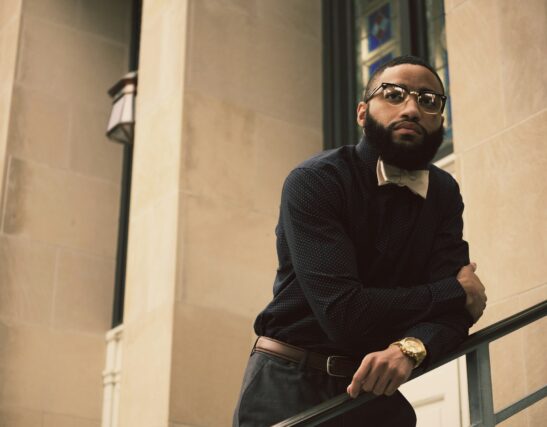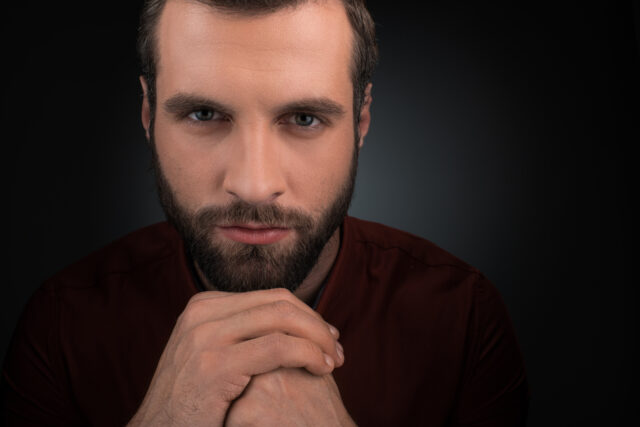We all experience moments of doubt in life when we’re not sure if we made the right decision or question whether we’re on the right path in life.

However, while that’s a natural human instinct, it becomes problematic when it keeps you paralysed and unable to make decisions or when it cripples you with constant second-guessing. Your gut is there to guide you, and it’s pretty spot on most of the time — so long as you know how to listen to it and trust what it tells you. While critical thinking and questioning your choices is vital for growth, if you’re ready to let your intuition start leading the way a bit more often, here’s how to find peace and trust yourself a bit more. It might not change overnight, but keep at it, and you’ll notice a major difference in no time.
1. Notice patterns of doubt when they crop up.
 Source: Unsplash
Source: Unsplash The first step to stopping second-guessing is catching those moments when doubt sneaks in. Pay attention to when you start overthinking things, hesitating, or replaying mistakes from the past in your head. By recognising when and why self-doubt shows up, you can start addressing it right away. Usually, it comes from fear of failure or worrying about what anyone else might think. Once you realise that’s what’s going on, you can shift your focus back to the present, away from all the “what-ifs” and “I should’ve” thoughts. Understanding what triggers your doubts gives you more control, so you’re not just reacting to them.
2. Learn to differentiate between instincts and fear.

Trusting your gut means knowing the difference between a real instinct and the voice of fear. Fear tends to come from past experiences or anxiety about the future, while instincts are that calm inner knowing about what’s right in the moment. So, when you feel uncertain, take a step back and check in with yourself. Does it feel grounded and clear, or does it feel anxious and tight? If it’s the latter, it’s probably fear talking. When it’s your gut, it’s usually calm, present, and reassuring. Being able to recognise the difference will help you trust your decisions and stop overthinking them.
3. Start small with everyday choices.

You don’t have to start with huge, life-changing decisions to build trust in your instincts. Try making small, low-pressure choices, like picking a restaurant for dinner or choosing an outfit for the day. These little decisions help you build confidence and practise trusting yourself without all the stress. When you make these small choices and feel good about them, you’ll start to trust your gut more, which means you’ll feel more confident in bigger decisions down the road.
4. Let go of the need to be perfect.

Perfectionism loves to fuel second-guessing. When you expect everything to be “perfect,” it makes every decision feel way more intense. But guess what? Perfection isn’t real, and it’s not something you have to strive for. Embracing imperfection helps you let go of the fear of making the wrong choice. Life’s not about getting everything right; it’s about learning, growing, and adapting along the way. The more you embrace this mindset, the more confident you’ll feel in your decisions, even when things don’t go exactly as planned.
5. Look back on the success you’ve already experienced.
 Source: Unsplash
Source: Unsplash Think back to times when you trusted your instincts, even when you were unsure. Maybe it was a big decision or just a small gut feeling you followed. Look at the times when things turned out well, even though it felt uncertain at the time. These are the moments that prove you have the ability to make good decisions. Writing them down or revisiting them in your mind can help push aside those fears of failure when you’re doubting yourself. Reminding yourself of past wins gives you the reassurance that your instincts are on point.
6. Limit outside noise.
 Source: Unsplash
Source: Unsplash It’s tempting to ask for advice from everyone around you, but constantly asking for everyone else’s input can make you doubt yourself even more. The more opinions you take in, the harder it becomes to hear your own voice. It’s important to strike a balance — sometimes it’s good to get feedback from trusted friends or family, but ultimately, you know yourself best. Trusting your own judgement is key. The more you tune out the noise, the easier it becomes to make decisions that align with your values and path.
7. Try to incorporate a bit of mindfulness into your life.
 Source: Unsplash
Source: Unsplash Mindfulness is a great way to tune into your thoughts and feelings, which is exactly what you need when second-guessing yourself. Being mindful helps you stay in the moment, without getting caught up in all the “what ifs” and fears. Taking a mindful pause, whether it’s through deep breathing, journaling, or a quick meditation, lets you connect with your gut instinct. Regular mindfulness practices help you stay grounded, making it easier to trust your inner voice instead of second-guessing everything.
8. Set realistic expectations.

Unrealistic expectations only add to the pressure, making every decision feel like it needs to be flawless. This can fuel second-guessing, because you’re setting yourself up for disappointment. Try to keep your expectations grounded in reality. Give yourself room to grow, make mistakes, and learn along the way. When you embrace realistic goals, decision-making becomes less intimidating, and you’ll be more likely to trust your gut rather than getting stuck in indecision.
9. Accept that no decision is perfect.

Here’s the thing: there’s rarely a “perfect” choice. Thinking there is can lead to overthinking and second-guessing, which is totally unhelpful. There are often multiple paths that could work out, and no one choice is going to make or break your entire life. Knowing this helps you move forward without the constant fear of making the “wrong” decision. Trusting your instincts means moving forward with confidence, even if you’re not sure what’s going to happen.
10. Stop replaying decisions you’ve already made.

It’s so easy to get stuck in the “what if” game. If you’re replaying past decisions over and over in your mind, it just fuels the doubt and prevents you from moving forward. Once you’ve made a decision, try to shift your focus to what’s next. You can’t change what’s already happened, and second-guessing won’t help you either. Focusing on what’s ahead keeps you moving forward with confidence instead of getting stuck in regret.
11. Develop a decision-making process.
 Source: Unsplash
Source: Unsplash Having a process for making decisions can reduce the need to second-guess. Whether you make a pros-and-cons list, set a time limit for decision-making, or go with your gut from the start, having a structured way to approach decisions helps you feel more confident. When you stick to a process, it’s easier to trust yourself because you’re following a method that works for you, not just reacting on impulse.
12. Be nice to yourself.
 Source: Unsplash
Source: Unsplash The inner critic loves to show up when you’re doubting yourself. Self-criticism only amplifies second-guessing and makes you question your ability to make decisions. Practising self-compassion is crucial here. Remind yourself that it’s okay to make mistakes and that it doesn’t make you any less capable. Encouraging yourself instead of tearing yourself down builds a healthier mindset and makes it easier to trust your instincts next time.
13. Learn to embrace risks.
 Source: Unsplash
Source: Unsplash Trusting your instincts often means taking risks, and let’s face it, risks can be uncomfortable. But the more you step out of your comfort zone, the more you’ll grow. Start small with manageable risks, and gradually take on bigger ones. The more you take risks, the easier it gets to trust that your gut knows the way, even when the outcome feels uncertain.
14. When you need support, ask for it.

While it’s important to trust yourself, there’s no harm in asking for support when you need it. Whether it’s from a trusted friend, mentor, or therapist, sometimes getting an outside perspective can help you feel more confident in your own decisions. The key is balancing asking for advice with trusting your own judgement. Knowing when to lean on other people and when to listen to yourself is a valuable skill.
15. Celebrate your progress.

Every time you trust your instincts and make a decision, even if it’s small, you’re moving closer to becoming more self-assured. Celebrate those moments, whether you made a good choice or learned something along the way. The more you recognise these wins, the more confidence you’ll build. Over time, trusting yourself will feel more natural, and you’ll notice less second-guessing in your life.




